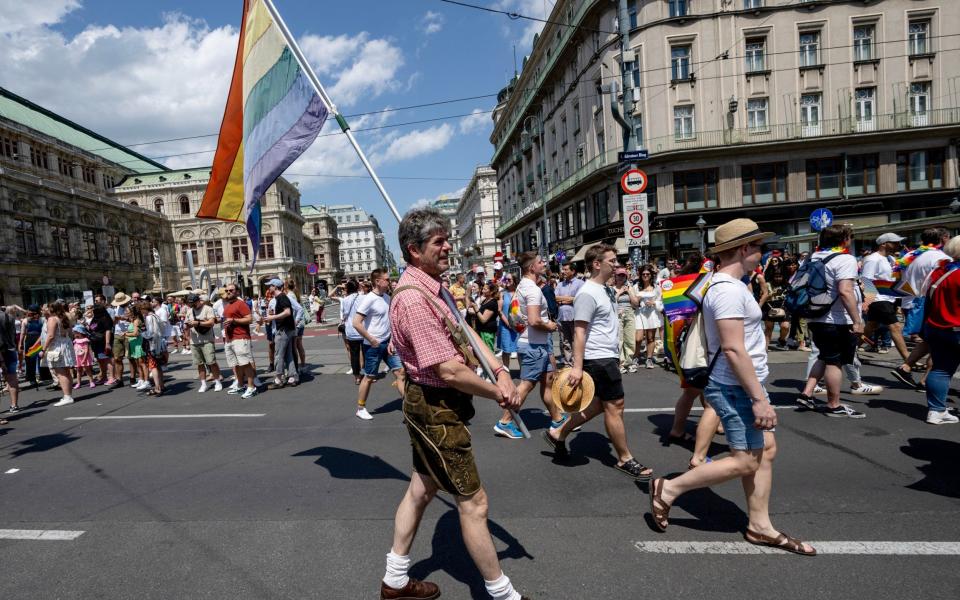Austria’s poll-topping Freedom Party (FPÖ) plans to enshrine in law that there are only two genders in the country’s constitution.
The move comes as part of a crackdown on “woke madness” that includes banning transgender athletes from women’s sport.
The far-Right FPÖ is predicted to triumph in a general election on Sept 29, completing a remarkable comeback since it was ousted from coalition government in 2019 amid a corruption scandal.
It has pledged to make a provision in Austria’s constitution that there are only two genders and end rules allowing people to choose anything other than those when they sign the civil register, which is necessary when moving into a new address to get access to benefits, health insurance and other social rights.
The party manifesto also promises a ban on civil servants from using gender-inclusive language and an end to public funding for so-called woke ideology.
It says: “Anyone who thinks they can arbitrarily determine the number of genders or change gender at will is disregarding the nature of human beings.
“The number of people who do not want to identify as either a man or a woman is negligible. That is why we are opposed to permanent transgender brainwashing, which is ultimately only aimed at destroying our social foundations.”

The party programme also vows to protect children and “firmly reject indoctrination with transgender ideology”.
The manifesto adds, before promising to stop taxpayers’ money going towards the promotion of “queer” and “woke” experiments: “Drag queens have no place in schools and nurseries.”
Its manifesto vows to “save women’s sport” by banning transgender or intersex athletes competing in female events.
It follows the controversy in women’s boxing at the Paris Olympics in which two gold medal winners competed despite being said to have failed the gender eligibility test.
The manifesto states: “We, the Freedom Party, are in favour of respecting the laws of biology. We will therefore lobby the sports federations and sports clubs to ensure that intersex or transgender athletes are not allowed to compete in women’s sports competitions.”
Chaber (sic), the executive director of the International Lesbian, Gay, Bisexual, Trans and Intersex Association’s Europe arm, condemned the policies, saying: “[They] represent a direct attack on the dignity and rights of trans people in Austria.
“These policies are not only regressive but are a blatant violation of human rights, reproducing discrimination against an already marginalised community.
“We call on voters to exercise their democratic right and vote against intolerance and discrimination.”
A spokesperson for Trans Europe and Central Asia said: “The FPO’s manifesto is alarming, and is perpetuating harmful myths about trans people in sports and education.”
The umbrella organisation for more than 200 trans rights groups added, “Austria already has one of the highest rates of discrimination against trans and non-binary people in the EU.
“What we need at this moment in Austria is in fact a stronger commitment to the recognition of trans people and respect for their human rights.”


Since taking over in 2021, FPÖ leader Herbert Kickl has rebuilt it into a political force by ruthlessly exploiting unease over coronavirus rules, particularly an ultimately ditched move to make jabs compulsory, and immigration.
The Eurosceptic FPÖ has promised a pardon for anyone convicted of breaching coronavirus rules and to repay any fines imposed during the pandemic.
The manifesto says coronavirus regulations were encroachments on fundamental rights “accompanied by unprecedented indoctrination and brainwashing”.
It adds: “These methods are now also being applied in other areas – from the gender mania and LGBTIQ propaganda to the early sexualisation of children,”
The FPÖ is pro-Putin but Mr Kickl insists he is only defending Austria’s constitutionally guaranteed neutrality.
The manifesto scarcely mentions the war in Ukraine, except to blame it for rising inflation, to rule out any deliveries of weapons to Kyiv from Vienna and to call for an “active peace policy” instead of Nato policies.
It accused the current coalition government, which has supported EU sanctions against Moscow, of “an anti-neutrality stance in the Ukraine war, which harms us more than Russia and does not end the war”.
The FPÖ is in a European Parliament alliance with Fidesz, the party led by Hungary’s Viktor Orbán, who is also against EU sanctions on Moscow.
Like Mr Orbán, any FPÖ-led government is likely to be stridently anti-migrant and Eurosceptic and its programme pledges to protect national identity in the face of “political Islam”.


The manifesto warns, before vowing to fight the EU’s ban on the combustion engine and other net zero measures: “The government of the state is increasingly no longer in Vienna, but in Brussels.
“The space of the state is being eliminated by the de facto principle of open borders.The people of the state are gradually being replaced by permanent mass immigration.”
The manifesto calls for new constitutional provisions to guarantee both Austrian neutrality and sovereignty.
The FPÖ promises to build “Fortress Austria” if elected and oppose EU quotas of resettled migrants from other under pressure member states.
It also wants offshore migrant processing centres in a similar arrangement to the UK’s ditched Rwanda plan, and to suspend EU asylum rules through emergency legislation until numbers drop.
Its crackdown will prevent asylum seekers getting citizenship, give their residency rights an expiry date, pay their benefits only in kind and not in cash and stop family reunion.
The FPÖ was the most successful Austrian party in June’s European Parliament elections. Polls also have it taking about 30 per cent of the vote in the general election, ahead of the traditional centre-Right and centre-Left parties on about 20 per cent each.
Forming a coalition government could be complicated, however, since the leaders of all five rival parliamentary parties have ruled out a coalition with Mr Kickl.
Marcus How, head of research and analysis at ViennEast Consulting in Vienna, said: “Nonetheless, the most likely coalition partner of the FPÖ is the ÖVP (Austrian People’s Party). Both parties have considerable policy overlap in addition to having formed coalitions three times previously.”
Source Agencies


